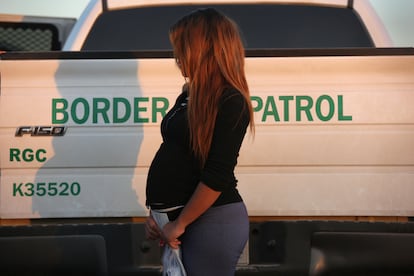Birthright citizenship: what is it and what will happen after Trump’s executive order to end it
1.2 million U.S. citizens were born to unauthorized immigrant parents in 2022

As part of his first actions as president, Donald Trump signed an executive order that would end birthright citizenship as part of his anti-immigrant agenda. This means that babies born in the United States to migrant parents would not be considered Americans, as all those born for more than a century have been. The order would put the citizenship of about 1.2 million infants at risk, and is in line with comments the current president made about his plans to return entire families to their places of origin. However, an amendment to the Constitution could stop the initiative from moving forward.
This Thursday, a federal judge temporarily blocked Trump’s attempt. Senior U.S. District Judge John Coughenour issued a temporary restraining order blocking the order from taking effect nationwide. “This is a blatantly unconstitutional order,” he said at a hearing in which he communicated his decision in response to a lawsuit filed by the attorneys general of Washington, Illinois, Oregon and Arizona. Apart from these, 18 other states, along with activist groups and pregnant women, filed five more lawsuits to stop the order on the grounds that it violates the 14th Amendment. The order will remain blocked for at least 14 days.
What is birthright citizenship?
The Fourteenth Amendment to the U.S. Constitution states that “All persons born or naturalized in the United States, and subject to the jurisdiction thereof, are citizens of the United States and of the State wherein they reside.” It was adopted on July 9, 1868 as part of the Reconstruction Amendments after the Civil War, and was conceived as a response to problems related to African-Americans who had been enslaved. In 1898, the U.S. Supreme Court confirmed that birthright citizenship extends to the children of immigrants in Wong Kim Ark v. United States.
The first section of the amendment states that “no State shall deprive any person of life, liberty, and property without due process of law,” which has formed the basis for some of the Supreme Court’s most important decisions, including Brown v. Board of Education (1954) about racial segregation, Loving vs. Virginia (1967) on interracial marriage, Roe v. Wade (1973) on abortion (which was overturned under the first Trump administration). It also establishes the Equal Protection Clause, which requires each State to provide protection under the law to all persons, including non-citizens, within its jurisdictions.
Under the new interpretation, the privilege of receiving U.S. citizenship at birth does not automatically apply to persons born in the United States if the mother was in the country illegally and the father was not a citizen or permanent resident, or if the mother was in the country legally, but on a temporary basis (such as on a tourist, student or work visa) and the father was also not a citizen or permanent resident. This reflects the anti-immigration stance that argues that birthright citizenship encourages pregnant women to cross into the United States so that their children will be U.S. citizens at birth.
Can Trump take away the right to citizenship?
Most experts say Trump cannot remove birthright citizenship with an executive order. Because of what the Fourteenth Amendment to the Constitution says, the United States would face a wave of legal challenges from those denied citizenship, which could take the matter to the U.S. Supreme Court.
In fact, the day after Trump took office, 22 states, with the District of Columbia and the city of San Francisco, filed lawsuits against the executive order claiming it is unconstitutional.
New Jersey Attorney General Matthew J. Platkin called the order “extreme” and asserted that Trump has no authority to rewrite the Constitution. In addition, pro-immigrant groups, such as the ACLU, joined the legal effort, arguing that the order inflicts grave harm by denying citizenship to U.S.-born children. The lawsuit seeks to have the court declare the executive order, which will take effect in February, unconstitutional.
Can the fourteenth amendment be changed?
No. What could happen is to make another constitutional amendment that eliminates birthright citizenship; however, for this to be done, it requires a two-thirds vote of the House of Representatives and the Senate and the approval of three-fourths of the nation’s states.
According to the Pew Research Center, in 2022, there were 1.2 million U.S. citizens born to unauthorized immigrant parents, so this is an approximate number of newborns who may not receive citizenship if Trump’s plans move forward. The Migration Policy Institute estimates that by eliminating birthright citizenship, the number of unauthorized immigrants could increase to 4.7 million by 2050, due to the cumulative effect of subsequent generations.
Tu suscripción se está usando en otro dispositivo
¿Quieres añadir otro usuario a tu suscripción?
Si continúas leyendo en este dispositivo, no se podrá leer en el otro.
FlechaTu suscripción se está usando en otro dispositivo y solo puedes acceder a EL PAÍS desde un dispositivo a la vez.
Si quieres compartir tu cuenta, cambia tu suscripción a la modalidad Premium, así podrás añadir otro usuario. Cada uno accederá con su propia cuenta de email, lo que os permitirá personalizar vuestra experiencia en EL PAÍS.
¿Tienes una suscripción de empresa? Accede aquí para contratar más cuentas.
En el caso de no saber quién está usando tu cuenta, te recomendamos cambiar tu contraseña aquí.
Si decides continuar compartiendo tu cuenta, este mensaje se mostrará en tu dispositivo y en el de la otra persona que está usando tu cuenta de forma indefinida, afectando a tu experiencia de lectura. Puedes consultar aquí los términos y condiciones de la suscripción digital.









































